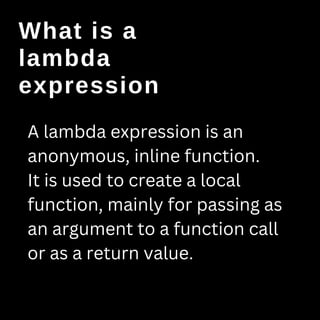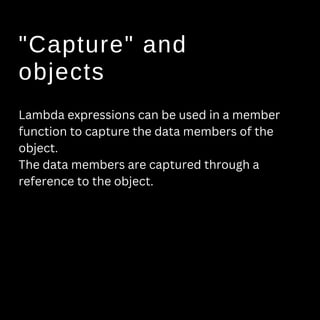"Capture" in lambda expression.
- 2. What is a lambda expression A lambda expression is an anonymous, inline function. It is used to create a local function, mainly for passing as an argument to a function call or as a return value.
- 3. Defining a lambda expression auto func = []() { // function body }; lambda introducer parameter list name
- 4. "Capture" in a lambda expression Capture makes variable in the local scope available for use in the body of the lambda expression. Write the name of the desired variable inside [] of the lamda expression. By default, variables are captured by value.
- 5. "Capture" in a lambda expression Capture by value #include <iostream> using namespace std; int main() { int x{10}; auto func = [x]() { cout << x << endl; }; func(); } Output: 10
- 6. "Capture" in a lambda expression Capture by reference #include <iostream> using namespace std; int main() { int x{10}; auto func = [&x]() { x++; }; func(); cout << x << endl; } Output: 11
- 7. "Capture" in a lambda expression To capture all local variables by value #include <iostream> using namespace std; int main() { int x{10}, y{20}; auto func = [=]() { cout << x << " " << y << endl; }; func(); } Output: 10 20
- 8. "Capture" in a lambda expression To capture all local variables by reference #include <iostream> using namespace std; int main() { int x{10}, y{20}; auto func = [&]() { x++; y++; }; func(); cout << x << " " << y << endl; } Output: 11 21
- 9. "Capture" and objects Lambda expressions can be used in a member function to capture the data members of the object. The data members are captured through a reference to the object.
- 10. "Capture" and objects #include <iostream> using namespace std; class Student { public: int age{ 10 }; public: void printAge() { auto lambdaAge = [this]() { cout << age << endl; }; lambdaAge(); } }; int main() { Student s; s.printAge(); } Output: 10
- 11. STAY CALM AND KEEP CODING! Lahiru Dilshan



![Defining a
lambda
expression
auto func = []()
{
// function body
};
lambda introducer
parameter list
name](https://image.slidesharecdn.com/lambdaexpression-221212041402-88aa77a4/85/Capture-in-lambda-expression-3-320.jpg)
!["Capture" in
a lambda
expression
Capture makes variable in the local scope
available for use in the body of the lambda
expression.
Write the name of the desired variable inside
[] of the lamda expression.
By default, variables are captured by value.](https://image.slidesharecdn.com/lambdaexpression-221212041402-88aa77a4/85/Capture-in-lambda-expression-4-320.jpg)
!["Capture" in
a lambda
expression
Capture by value
#include <iostream>
using namespace std;
int main()
{
int x{10};
auto func = [x]()
{
cout << x << endl;
};
func();
}
Output: 10](https://image.slidesharecdn.com/lambdaexpression-221212041402-88aa77a4/85/Capture-in-lambda-expression-5-320.jpg)
!["Capture" in
a lambda
expression
Capture by reference
#include <iostream>
using namespace std;
int main()
{
int x{10};
auto func = [&x]()
{
x++;
};
func();
cout << x << endl;
}
Output: 11](https://image.slidesharecdn.com/lambdaexpression-221212041402-88aa77a4/85/Capture-in-lambda-expression-6-320.jpg)
!["Capture" in
a lambda
expression
To capture all local variables by value
#include <iostream>
using namespace std;
int main()
{
int x{10}, y{20};
auto func = [=]()
{
cout << x << " " << y << endl;
};
func();
}
Output: 10 20](https://image.slidesharecdn.com/lambdaexpression-221212041402-88aa77a4/85/Capture-in-lambda-expression-7-320.jpg)
!["Capture" in
a lambda
expression
To capture all local variables by reference
#include <iostream>
using namespace std;
int main()
{
int x{10}, y{20};
auto func = [&]()
{
x++; y++;
};
func();
cout << x << " " << y << endl;
}
Output: 11 21](https://image.slidesharecdn.com/lambdaexpression-221212041402-88aa77a4/85/Capture-in-lambda-expression-8-320.jpg)

!["Capture" and
objects
#include <iostream>
using namespace std;
class Student
{
public:
int age{ 10 };
public:
void printAge()
{
auto lambdaAge = [this]()
{
cout << age << endl;
};
lambdaAge();
}
};
int main()
{
Student s;
s.printAge();
}
Output: 10](https://image.slidesharecdn.com/lambdaexpression-221212041402-88aa77a4/85/Capture-in-lambda-expression-10-320.jpg)
